We wouldn’t dream of abandoning our vast semi–annual Most Anticipated Book Previews, but we thought a monthly reminder would be helpful (and give us a chance to note titles we missed the first time around). Here’s what we’re looking out for this month: our picks include debut novels and nonfiction, as well as works from established, prize-winning authors! Let us know what you’re looking forward to in the comments!
Want to know about the books you might have missed? Then go read our most recent book preview. Want to help The Millions keep churning out great books coverage? Then sign up to be a member today.
 The Evening Hero by Marie Myung-Ok Lee: In the Millions’ own Lee’s long-awaited new novel, a Korean immigrant pursuing the American Dream must confront the secrets of the past or risk watching the world he’s worked so hard to build come crumbling down. Dr. Yungman Kwak has worked as an obstetrician for 50 years, treating the women and babies of the small rural Minnesota town he chose to call home. But a letter arrives, and Yungman faces a choice—he must choose to hide his secret from his family and friends or confess and potentially lose all he’s built. The Evening Hero is a moving and darkly comic novel about a man looking back at his life and asking big questions about what is lost and what is gained when immigrants leave home for new shores. (Adam P.)
The Evening Hero by Marie Myung-Ok Lee: In the Millions’ own Lee’s long-awaited new novel, a Korean immigrant pursuing the American Dream must confront the secrets of the past or risk watching the world he’s worked so hard to build come crumbling down. Dr. Yungman Kwak has worked as an obstetrician for 50 years, treating the women and babies of the small rural Minnesota town he chose to call home. But a letter arrives, and Yungman faces a choice—he must choose to hide his secret from his family and friends or confess and potentially lose all he’s built. The Evening Hero is a moving and darkly comic novel about a man looking back at his life and asking big questions about what is lost and what is gained when immigrants leave home for new shores. (Adam P.)
 Remarkably Bright Creatures by Shelby Van Pelt: In the midst of compounding grief, 70-year-old Tova Sullivan takes a night shift custodial job at the local aquarium. In between mopping the floors and wiping glass enclosures, she meets Marcellus, a giant Pacific octopus, who she forms an unorthodox but remarkable friendship with. Their relationship becomes interwoven with the mystery at the heart of Tova’s life: the disappearance of Erik, her 18-year-old son, thirty years earlier. Kevin Wilson writes: “Shelby Van Pelt makes good on this wild conceit, somehow making me love a misanthropic octopus, but her writing is so finely tuned that it’s a natural element of a larger story about family, about loss, and the electricity of something found.” (Carolyn)
Remarkably Bright Creatures by Shelby Van Pelt: In the midst of compounding grief, 70-year-old Tova Sullivan takes a night shift custodial job at the local aquarium. In between mopping the floors and wiping glass enclosures, she meets Marcellus, a giant Pacific octopus, who she forms an unorthodox but remarkable friendship with. Their relationship becomes interwoven with the mystery at the heart of Tova’s life: the disappearance of Erik, her 18-year-old son, thirty years earlier. Kevin Wilson writes: “Shelby Van Pelt makes good on this wild conceit, somehow making me love a misanthropic octopus, but her writing is so finely tuned that it’s a natural element of a larger story about family, about loss, and the electricity of something found.” (Carolyn)
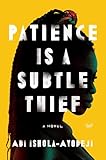 Patience is a Subtle Thief by Abi Ishola-Ayodeji: In Ishola-Ayodeji’s coming-of-age debut, 18-year-old Patience Adewale is the eldest daughter of her politically powerful and influential father, Chief Kolade Adewale. After her mother’s mysterious disappearance years earlier, Patience is determined to figure out what happened to her. When Patience leaves for university in Lagos, she reunites with her cousin Kash and becomes increasingly enmeshed in her petty criminal activities. Kirkus’ starred review calls the novel “a poignant, revealing, and rueful tale of how much the political can affect the personal.”(Carolyn)
Patience is a Subtle Thief by Abi Ishola-Ayodeji: In Ishola-Ayodeji’s coming-of-age debut, 18-year-old Patience Adewale is the eldest daughter of her politically powerful and influential father, Chief Kolade Adewale. After her mother’s mysterious disappearance years earlier, Patience is determined to figure out what happened to her. When Patience leaves for university in Lagos, she reunites with her cousin Kash and becomes increasingly enmeshed in her petty criminal activities. Kirkus’ starred review calls the novel “a poignant, revealing, and rueful tale of how much the political can affect the personal.”(Carolyn)
 Holding Her Breath by Eimear Ryan: With what Marie-Helene Bertino calls “patient and searing storytelling,” Banshee Press co-founder Ryan’s debut novel follows Beth Crowe, a competitive collegiate swimmer who begins to redefine herself after a breakdown. As the granddaughter of Benjamin Crowe, a famous poet who died by suicide at 43, Beth must navigate the attention of the campus’ literature department and Justin, a flirtatous postdoc lecturer, who may have ulterior motives. As she navigates a secret affair, an identity crisis, and unearthed familial secrets, Beth must come to terms with who she is and who she could be. (Carolyn)
Holding Her Breath by Eimear Ryan: With what Marie-Helene Bertino calls “patient and searing storytelling,” Banshee Press co-founder Ryan’s debut novel follows Beth Crowe, a competitive collegiate swimmer who begins to redefine herself after a breakdown. As the granddaughter of Benjamin Crowe, a famous poet who died by suicide at 43, Beth must navigate the attention of the campus’ literature department and Justin, a flirtatous postdoc lecturer, who may have ulterior motives. As she navigates a secret affair, an identity crisis, and unearthed familial secrets, Beth must come to terms with who she is and who she could be. (Carolyn)
 The Premonitions Bureau by Sam Knight: New Yorker staff writer Knight writes about the 1960s “premonitions bureau,” which was a joint venture between psychiatrist John Barker and science reporter Peter Fairley at the Evening Standard in London. The two set out to collect dreams, visions, and inklings from the public in order to better understand the scientific probability of correct premonitions. Early praise for Knight’s first book include Patrick Radden Keefe (“an enveloping, unsettling book, gorgeously written and profound”); Hilary Mantel (“beautifully ordered, humane, capacious”); and Robert Kolker (“prepare for amazements on nearly every page”). (Carolyn)
The Premonitions Bureau by Sam Knight: New Yorker staff writer Knight writes about the 1960s “premonitions bureau,” which was a joint venture between psychiatrist John Barker and science reporter Peter Fairley at the Evening Standard in London. The two set out to collect dreams, visions, and inklings from the public in order to better understand the scientific probability of correct premonitions. Early praise for Knight’s first book include Patrick Radden Keefe (“an enveloping, unsettling book, gorgeously written and profound”); Hilary Mantel (“beautifully ordered, humane, capacious”); and Robert Kolker (“prepare for amazements on nearly every page”). (Carolyn)
 Either/Or by Elif Batuman: This novel is a continuation of the story of Selin, Batuman’s protagonist from The Idiot, which was a finalist for a Pulitzer Prize and shortlisted for the Women’s Prize for Fiction in the UK. It’s 1996 and Selin, the one in her family who got to go to Harvard, is now in her sophomore year. Guided by her literature syllabus and more worldly peers, she tries to figure out how to live a worthwhile life. (Claire)
Either/Or by Elif Batuman: This novel is a continuation of the story of Selin, Batuman’s protagonist from The Idiot, which was a finalist for a Pulitzer Prize and shortlisted for the Women’s Prize for Fiction in the UK. It’s 1996 and Selin, the one in her family who got to go to Harvard, is now in her sophomore year. Guided by her literature syllabus and more worldly peers, she tries to figure out how to live a worthwhile life. (Claire)
 How to Be Eaten by Maria Adelmann: Adelmann’s (Girls of a Certain Age) feminist debut novel takes the classic fairy tales of our youth and turns them on their head. Brought together by experimental group therapy, five women begin to process the trauma undergone during each retelling—and consider why they really have been brought together. About the darkly whimsical novel, Rachel Yoder says, ““Even better than it sounds, How to be Eaten presents vividly real women haunted by their fairy tale pasts in this deliciously angsty debut. Pure fun pulsing with a dark heart.” (Carolyn)
How to Be Eaten by Maria Adelmann: Adelmann’s (Girls of a Certain Age) feminist debut novel takes the classic fairy tales of our youth and turns them on their head. Brought together by experimental group therapy, five women begin to process the trauma undergone during each retelling—and consider why they really have been brought together. About the darkly whimsical novel, Rachel Yoder says, ““Even better than it sounds, How to be Eaten presents vividly real women haunted by their fairy tale pasts in this deliciously angsty debut. Pure fun pulsing with a dark heart.” (Carolyn)
 Moldy Strawberries by Caio Fernando Abreu (translated by Bruna Dantas Lobato): A collection of eighteen stories from one of Brazil’s most influential writers appears in English for the first time. The late Abreu explores the lengths people will go to find connections, stifle loneliness, live wildly, and spite death in the face of the AIDS epidemic and a military dictatorship in 1970s and 1980s Brazil. Lucy Ives says: “Lending an almost painfully humane eye and ear to his characters, Caio Fernando Abreu constructs scenarios of staggering psychological depth from everyday gestures and occasions.” (Carolyn)
Moldy Strawberries by Caio Fernando Abreu (translated by Bruna Dantas Lobato): A collection of eighteen stories from one of Brazil’s most influential writers appears in English for the first time. The late Abreu explores the lengths people will go to find connections, stifle loneliness, live wildly, and spite death in the face of the AIDS epidemic and a military dictatorship in 1970s and 1980s Brazil. Lucy Ives says: “Lending an almost painfully humane eye and ear to his characters, Caio Fernando Abreu constructs scenarios of staggering psychological depth from everyday gestures and occasions.” (Carolyn)
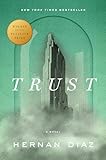 Trust by Hernan Diaz: The Pulitzer Prize finalist follows up his brilliant western In the Distance with Trust, a story of the Wall Street tycoons of the Gilded Age with a reality-bending literary mystery at its heart, in keeping with the postmodern historical beauties of In the Distance. Of the novel, Rachel Kushner said, “Its plotlines are as etched and surreal as Art Deco geometry, while inside that architecture are people who feel appallingly real. This novel is very classical and very original: Balzac would be proud, but so would Borges.” (Lydia)
Trust by Hernan Diaz: The Pulitzer Prize finalist follows up his brilliant western In the Distance with Trust, a story of the Wall Street tycoons of the Gilded Age with a reality-bending literary mystery at its heart, in keeping with the postmodern historical beauties of In the Distance. Of the novel, Rachel Kushner said, “Its plotlines are as etched and surreal as Art Deco geometry, while inside that architecture are people who feel appallingly real. This novel is very classical and very original: Balzac would be proud, but so would Borges.” (Lydia)
 The Hacienda by Isabel Cañas: Set after the Mexican War of Independence, recently orphaned and destitute Beatriz accepts the proposal of Don Rodolfo Solórzano and goes to live on his estate, Hacienda San Isidro. She quickly begins to hear strange voices, see things, and feel as if she’s being watched, but her concerns are ignored by the staff. Beatriz knows the hacienda is not what it appears and that this dream home is actually a nightmare. In their starred review, Publishers Weekly calls the debut “Mexican Gothic meets Rebecca,” and says that “Cañas clearly knows the genre, alternately deploying and subverting haunted house tropes. The result is a brilliant contribution to the new wave of postcolonial Gothics.” (Carolyn)
The Hacienda by Isabel Cañas: Set after the Mexican War of Independence, recently orphaned and destitute Beatriz accepts the proposal of Don Rodolfo Solórzano and goes to live on his estate, Hacienda San Isidro. She quickly begins to hear strange voices, see things, and feel as if she’s being watched, but her concerns are ignored by the staff. Beatriz knows the hacienda is not what it appears and that this dream home is actually a nightmare. In their starred review, Publishers Weekly calls the debut “Mexican Gothic meets Rebecca,” and says that “Cañas clearly knows the genre, alternately deploying and subverting haunted house tropes. The result is a brilliant contribution to the new wave of postcolonial Gothics.” (Carolyn)
 Saint Sebastian’s Abyss by Mark Haber: The unnamed narrator of Haber’s newest finds himself on a flight to Germany to be beside Schmidt, his estranged best friend who is on his deathbed. Thinking back on their decades-long friendship, he remembers how they were brought together—and then torn apart—by their mutual obsession and fascination with Dutch Renaissance painter Count Hugo Beckenbauer’s masterpiece, Saint Sebastian’s Abyss. Hernan Diaz says, “Aesthetic value, history, institutions, criticism, authorship, material conditions—these are only some of the terms in the critical constellation that emerges in Haber’s beautiful, elegant novel.” (Carolyn)
Saint Sebastian’s Abyss by Mark Haber: The unnamed narrator of Haber’s newest finds himself on a flight to Germany to be beside Schmidt, his estranged best friend who is on his deathbed. Thinking back on their decades-long friendship, he remembers how they were brought together—and then torn apart—by their mutual obsession and fascination with Dutch Renaissance painter Count Hugo Beckenbauer’s masterpiece, Saint Sebastian’s Abyss. Hernan Diaz says, “Aesthetic value, history, institutions, criticism, authorship, material conditions—these are only some of the terms in the critical constellation that emerges in Haber’s beautiful, elegant novel.” (Carolyn)
 Constellations of Eve by Abbigail Nguyen Rosewood: Rosewood’s experimental literary triptych offers three different versions of one couple’s relationship. The narrative variations build and converge to show the ways Eve and Liam remain in each other’s orbit despite different timelines, partners, and life decisions; the novel explores the simultaneous pain and pleasure found in the lives we choose in relation to the ones we don’t. Binnie Kirshenbaum writes: “With each discrete episode chronicling Eve’s life, Rosewood unflinchingly exposes the disturbing complexities, conundrums, and fears that accompany love, marriage, and motherhood.” (Carolyn)
Constellations of Eve by Abbigail Nguyen Rosewood: Rosewood’s experimental literary triptych offers three different versions of one couple’s relationship. The narrative variations build and converge to show the ways Eve and Liam remain in each other’s orbit despite different timelines, partners, and life decisions; the novel explores the simultaneous pain and pleasure found in the lives we choose in relation to the ones we don’t. Binnie Kirshenbaum writes: “With each discrete episode chronicling Eve’s life, Rosewood unflinchingly exposes the disturbing complexities, conundrums, and fears that accompany love, marriage, and motherhood.” (Carolyn)
 We Do What We Do in the Dark by Michelle Hart: In the midst of grieving her mother, college freshman Mallory strikes up an all-consuming affair with an older, married, and enigmatic woman. Unsure of who she is and what she wants, Mallory must come to terms with how the relationship upended her life and who she wants to become in the aftermath. About Hart’s debut novel, Meg Wolitzer says: “Michelle Hart’s first novel is a haunting study of solitude and connection, moving and memorable.” (Carolyn)
We Do What We Do in the Dark by Michelle Hart: In the midst of grieving her mother, college freshman Mallory strikes up an all-consuming affair with an older, married, and enigmatic woman. Unsure of who she is and what she wants, Mallory must come to terms with how the relationship upended her life and who she wants to become in the aftermath. About Hart’s debut novel, Meg Wolitzer says: “Michelle Hart’s first novel is a haunting study of solitude and connection, moving and memorable.” (Carolyn)
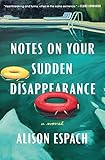 Notes on Your Sudden Disappearance by Alison Espach: Espach (The Adults) returns with a novel about a woman thinking back on the tragic summer that changed her life forever. Moving in and out of time, Sally remembers her older sister Kathy, who died tragically as a teenager, and reunites with Billy, her sister’s ex boyfriend, who she should avoid but is drawn to nevertheless. About the novel, our own Emily St. John Mandel says: “Espach is an immensely talented writer, and her prose unfolds with a devastating lightness of touch. This novel is deeply moving, always excellent, and often unexpectedly funny.” (Carolyn)
Notes on Your Sudden Disappearance by Alison Espach: Espach (The Adults) returns with a novel about a woman thinking back on the tragic summer that changed her life forever. Moving in and out of time, Sally remembers her older sister Kathy, who died tragically as a teenager, and reunites with Billy, her sister’s ex boyfriend, who she should avoid but is drawn to nevertheless. About the novel, our own Emily St. John Mandel says: “Espach is an immensely talented writer, and her prose unfolds with a devastating lightness of touch. This novel is deeply moving, always excellent, and often unexpectedly funny.” (Carolyn)
 Ill Feelings by Alice Hattrick: Hattrick’s debut book chronicles the illness they share with their mother—ME, or Chronic Fatigue Syndrome—by blending memoir, history, biography, and literary nonfiction. Exploring case studies, diaries, and letters from ill women and about ill women, Hattrick reveals how sickness and illness narratives defy temporal, genre, and bodily definitions. “Ill Feelings defies neat conclusions as well as easy categorization of the book itself, so that attempting to describe it here seems like misdiagnosis, and to try and name the paradox at its heart seems like a betrayal of its rewards,” writes Olivia Sudjic. “But the thrill of Alice Hattrick’s writing stems from its struggle to be free of its constraints, communicating with unspooling fury the mutability of lived experience rather than presuming to define it.” (Carolyn)
Ill Feelings by Alice Hattrick: Hattrick’s debut book chronicles the illness they share with their mother—ME, or Chronic Fatigue Syndrome—by blending memoir, history, biography, and literary nonfiction. Exploring case studies, diaries, and letters from ill women and about ill women, Hattrick reveals how sickness and illness narratives defy temporal, genre, and bodily definitions. “Ill Feelings defies neat conclusions as well as easy categorization of the book itself, so that attempting to describe it here seems like misdiagnosis, and to try and name the paradox at its heart seems like a betrayal of its rewards,” writes Olivia Sudjic. “But the thrill of Alice Hattrick’s writing stems from its struggle to be free of its constraints, communicating with unspooling fury the mutability of lived experience rather than presuming to define it.” (Carolyn)
 Six Days in Rome by Francesca Giacco: Giacco’s debut novel follows Emilia, a heartbroken American artist, wandering the sights and streets of Rome looking for a way to escape her present and make sense of her past. When she meets American expat John, she begins to rebuild herself and break free from the men who always seemed to overshadow her. Paul Beatty writes: “An ode to funky wine labels, good taste, and true inspiration, Francesca Giacco has penned a stunningly cool and stylish debut.” (Carolyn)
Six Days in Rome by Francesca Giacco: Giacco’s debut novel follows Emilia, a heartbroken American artist, wandering the sights and streets of Rome looking for a way to escape her present and make sense of her past. When she meets American expat John, she begins to rebuild herself and break free from the men who always seemed to overshadow her. Paul Beatty writes: “An ode to funky wine labels, good taste, and true inspiration, Francesca Giacco has penned a stunningly cool and stylish debut.” (Carolyn)
 I Who Have Never Known Men by Jacqueline Harpman (translated by Ros Schwartz): With a new afterword by Sophie Mackintosh, Harpman’s post-apocalyptic feminist novel is back in print for the first time since 1997. Living in an underground cage, 39 women and one girl live alone with few memories of the past, no sense of time or space, and uncertainty and fear for the future. About the first edition, Le Nouvel Observateur wrote: “The delirium of I Who Have Never Known Men suggests the work of a feminine Kafka.” (Carolyn)
I Who Have Never Known Men by Jacqueline Harpman (translated by Ros Schwartz): With a new afterword by Sophie Mackintosh, Harpman’s post-apocalyptic feminist novel is back in print for the first time since 1997. Living in an underground cage, 39 women and one girl live alone with few memories of the past, no sense of time or space, and uncertainty and fear for the future. About the first edition, Le Nouvel Observateur wrote: “The delirium of I Who Have Never Known Men suggests the work of a feminine Kafka.” (Carolyn)
 Jameela Green Ruins Everything by Zarqa Nawaz: Writer and filmmaker Nawaz’s (Laughing All the Way to the Mosque) debut novel follows the eponymous Jameela on her quest to become a New York Times bestselling author. When her imam chides her shallow desires, he challenges her to perform a good deed—which unintentionally leads her into an absurd and dangerous scheme involving terrorists and the CIA. Canadian magazine Maclean’s says, “Nawaz’s understated humour shines in this lovely comedy of errors—and faith.” (Carolyn)
Jameela Green Ruins Everything by Zarqa Nawaz: Writer and filmmaker Nawaz’s (Laughing All the Way to the Mosque) debut novel follows the eponymous Jameela on her quest to become a New York Times bestselling author. When her imam chides her shallow desires, he challenges her to perform a good deed—which unintentionally leads her into an absurd and dangerous scheme involving terrorists and the CIA. Canadian magazine Maclean’s says, “Nawaz’s understated humour shines in this lovely comedy of errors—and faith.” (Carolyn)
 Teenager by Bud Smith: Sightseeing, car stealing, and run-ins with townies litter the pages of Smith’s (Double Bird) debut novel. When lovesick teenagers Kody and Tella learn that Tella’s parents are sending her to Rome (and away from Kody), the two teens run away from their homes in New Jersey and toward the open road. Publishers Weekly writes: “Evokes the surreal contrasts of the American landscape in smart, jittery prose. Smith makes this a trip worth taking.” (Carolyn)
Teenager by Bud Smith: Sightseeing, car stealing, and run-ins with townies litter the pages of Smith’s (Double Bird) debut novel. When lovesick teenagers Kody and Tella learn that Tella’s parents are sending her to Rome (and away from Kody), the two teens run away from their homes in New Jersey and toward the open road. Publishers Weekly writes: “Evokes the surreal contrasts of the American landscape in smart, jittery prose. Smith makes this a trip worth taking.” (Carolyn)
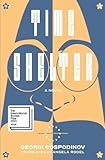 Time Shelter by Georgi Gospodinov (translated by Angela Rodel): Award-winning Bulgarian author Gospodinov’s newest novel follows an unnamed narrator (an amateur novelist) and ageriatric psychiatrist as they work together to build a new therapy technique focused (perhaps dangerously) on the power of nostalgia. Claire Messud writes: “In equal measure playful and profound, Georgi Gospodinov’s Time Shelter renders the philosophical mesmerizing, and the everyday extraordinary. I loved it.” (Carolyn)
Time Shelter by Georgi Gospodinov (translated by Angela Rodel): Award-winning Bulgarian author Gospodinov’s newest novel follows an unnamed narrator (an amateur novelist) and ageriatric psychiatrist as they work together to build a new therapy technique focused (perhaps dangerously) on the power of nostalgia. Claire Messud writes: “In equal measure playful and profound, Georgi Gospodinov’s Time Shelter renders the philosophical mesmerizing, and the everyday extraordinary. I loved it.” (Carolyn)
 You Have a Friend in 10A by Maggie Shipstead: A decades-long love affair takes place on a ranch in Montana. A former child star leaves her life inside a cult. A young woman searches for her lost lover in a desolate ski resort. Booker Prize nominee Shipstead (The Great Circle) returns with her sweeping debut story collection—which Publishers Weekly’s starred review calls “daring, wide-ranging” and “formally inventive and emotionally complex.” (Carolyn)
You Have a Friend in 10A by Maggie Shipstead: A decades-long love affair takes place on a ranch in Montana. A former child star leaves her life inside a cult. A young woman searches for her lost lover in a desolate ski resort. Booker Prize nominee Shipstead (The Great Circle) returns with her sweeping debut story collection—which Publishers Weekly’s starred review calls “daring, wide-ranging” and “formally inventive and emotionally complex.” (Carolyn)
 Family Album by Gabriela Alemán (translated by Dick Cluster and Mary Ellen Fieweger): In a follow-up to her English language debut Poso Wells, Alemán’s eight-story collection explores present-day South America by blending forgotten history, pop culture, folklore, and cultural heritage. Pilar Quintana says: “Gabriela Alemán’s stories unravel a rich and intriguing universe in which nothing, and no one, is what it seems.” (Carolyn)
Family Album by Gabriela Alemán (translated by Dick Cluster and Mary Ellen Fieweger): In a follow-up to her English language debut Poso Wells, Alemán’s eight-story collection explores present-day South America by blending forgotten history, pop culture, folklore, and cultural heritage. Pilar Quintana says: “Gabriela Alemán’s stories unravel a rich and intriguing universe in which nothing, and no one, is what it seems.” (Carolyn)
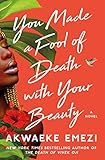 You Made a Fool of Death with Your Beauty by Akwaeke Emezi: National Book Award finalist Emezi (The Death of Vivek Oji) tackles a new genre in their romance debut. Five years after the love of her life died, Feyi is ready to date again. After she meets Nasir at a party, they begin a whirlwind summer romance full of wonder and possibility except for one little complication: she can’t stop thinking about Nasir’s father. (Carolyn)
You Made a Fool of Death with Your Beauty by Akwaeke Emezi: National Book Award finalist Emezi (The Death of Vivek Oji) tackles a new genre in their romance debut. Five years after the love of her life died, Feyi is ready to date again. After she meets Nasir at a party, they begin a whirlwind summer romance full of wonder and possibility except for one little complication: she can’t stop thinking about Nasir’s father. (Carolyn)









